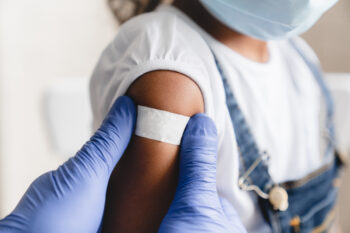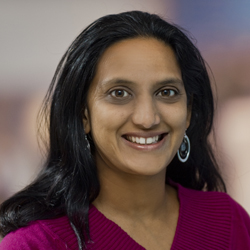 As summer starts to cool down, parents are all too familiar with the return of back to school prep and fun fall activities.
As summer starts to cool down, parents are all too familiar with the return of back to school prep and fun fall activities.
While families are busy checking off school supply lists and spending more time indoors through the chillier months, it might be easy to overlook the preventive care to help keep children safe from illnesses in the community and the upcoming annual flu season.
Last year brought an unprecedented tripledemic– with hospitals, including Seattle Children’s, facing a tremendous number of patients diagnosed with the flu, COVID-19 and the respiratory syncytial virus (RSV) that largely affects young children.
In October 2022 alone, Seattle Children’s emergency department saw twice as many patients than usual, sometimes running at 200% capacity.
To shed some light on current public health and safety, On The Pulse spoke with infectious disease experts Dr. Janet Englund and Dr. Sara Vora from Seattle Children’s Research Institute to learn how families can best protect themselves through the upcoming months.
Dr. Englund, who is also a professor in the Department of Pediatrics at the University of Washington School of Medicine, has long been involved in the research of respiratory viruses and their transmission in children, including studying RSV since the 1980s.
Dr. Vora, also an associate professor in the Department of Pediatrics at the University of Washington School of Medicine, has been an integral part of this research at Seattle Children’s, studying vaccines alongside Dr. Englund for flu and COVID-19.
Her expertise lies in improving the management of infections in immunocompromised children, including those who underwent a transplant or who have cancer.


Recently, the team has contributed to the research supporting an anticipated maternal RSV vaccine which can be administered to pregnant people to help transfer maternal RSV antibodies to newborns.
This is a promising first step in protection for infants born to vaccinated persons. This group has also contributed to the study and licensure of the new RSV monoclonal antibody, nirsevimab, which can now be given to young infants.
What kind of respiratory illnesses should parents expect this year?
Dr. Vora: I would expect this year to be more typical in terms of a late fall to early winter spike in illnesses we usually see like the flu and RSV. I think only time will tell, as I would expect that at some point between September and spring, we will see a rise in typical respiratory viruses, including COVID-19.
There are also other, perhaps less familiar, respiratory viruses as well which cause symptoms such as runny nose and cough but can also make kids quite sick.
Dr. Englund: RSV is important to be aware of because it can lead to hospitalization. RSV is one of the leading causes of hospitalization for young children not only at Seattle Children’s, but nationally as well. Additionally, influenza, as well as common cold viruses, may be in the mix as school-aged children return to in-person classrooms.
How should families prepare for this upcoming fall season?
Dr. Vora: There are certain things we can’t control and other things we can: Good hygiene practices, encouraging children to wash their hands frequently such as before meals and when coming home from being outside, covering mouths when people cough or sneeze and staying home when sick.
The other category of things that can be controlled is the protection provided for families through vaccines.
Dr. Englund: I think it’s important that kids get their flu vaccines, which is recommended beginning at 6 months of age. Flu vaccines are available annually and are typically administered around the beginning of September.
Getting a flu vaccine is a recommended standard practice because while the flu is a well-known annual virus, it can make some children very sick, especially considering that RSV and COVID ramp up during the same season.
A COVID vaccine booster is expected in the upcoming months, which will help protect against the new COVID virus variant.
Is it safe to receive all of these vaccinations at once?
Dr. Englund: Yes, it is very safe to receive all of these vaccines at once – however, it is important to consider timing of other infectious disease vaccines required to return to school.
For example, measles vaccines are given as two separate shots and are a live-virus vaccine, so it is recommended to wait at least four weeks after receiving the COVID-19 shot to receive the second measles shot.
Are there new tools available to protect families against RSV?
Dr. Vora: This month, the Centers for Disease Control and Prevention officially recommend that infants under 8 months should receive an injection of nirsevimab, a RSV monoclonal antibody shot, as infants enter their first winter and RSV season.
Dr. Englund: To clarify, antibody shots are made to protect against the virus as soon as the shot is given. A RSV vaccine is typically made of a little piece or protein of the virus, which your body then would react to in order to make antibodies inside your own body, which serves as self-made protection.
While the antibody can be a great defense against RSV, it is not the same as a vaccine. There is no RSV vaccine available for babies yet.
Dr. Vora: The monoclonal antibody shot is also recommended in the second year of life for higher-risk infants and toddlers such as those who are immunocompromised. The hope is that this new tool will prevent a lot of the emergency room visits and hospitalizations we saw last year.
Dr. Englund: There is an FDA-approved RSV vaccine for older people over 60 years of age, and is especially recommended for those who have underlying heart or lung disease. Families who live with older members – grandparents who are very involved in the care of kids, for example – should consider vaccinations for those who can be protected to help shield the entire household.
How to get involved with vaccination research at Seattle Children’s:
Dr. Englund and Dr. Vora are a part of the Pediatric Infectious Disease Research Group in the Center for Clinical and Translational Research at Seattle Children’s Research Institute. Much of the team’s work involves vaccine production and efficacy research, primarily within the pediatric population.
Some of their recent findings showed the safety and effectiveness of COVID-19 vaccines for children from 6 months to 4 years.
To learn more about how to participate in upcoming vaccine research studies, please email [email protected] or call 206-884-1100.
Resources:
- COVID-19 Vaccine Found Safe, Effective for Youngest Children (seattlechildrens.org)
- Seattle Children’s Research Division (seattlechildrens.org)
- Pediatric Infectious Disease Research Group’s COVID-19 Research
- COVID, Flu and RSV: How are These Respiratory Illnesses Different?
- RSV: When It’s More Than Just a Cold
- School and Child Care Immunizations Information for Families
- Immunization for Children Birth to Six Years
- Immunization for Children Seven to 18 Years

